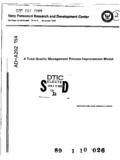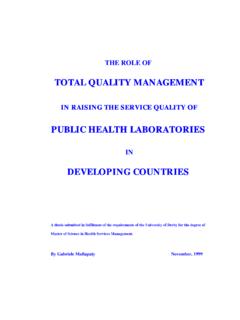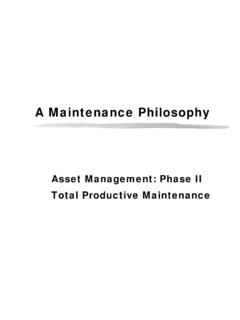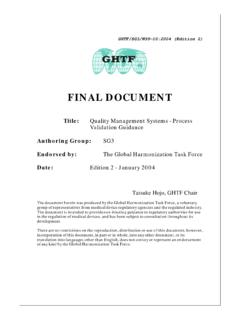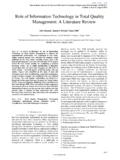Transcription of Quality Management and Supply Chain …
1 Proceedings of the 2014 International Conference on Industrial Engineering and Operations Management Bali, Indonesia, January 7 9, 2014. Quality Management and Supply Chain Management integration : a conceptual model Ana Cristina Fernandes, Paulo Sampaio and Maria do Sameiro Carvalho Systems and Production Department University of Minho Braga, Portugal Abstract Recent trends in the business world has forced companies to expand their activities into new regions where they can find qualified manpower, lower production costs, high availability of raw materials giving rise to wider and more complex Supply chains but also bringing in new opportunities to leverage their competitive advantages. These changes require the implementation of new organizational models with different suppliers and partners responsible for an important part of the final product and consequently to provide a service of excellence to satisfy customers.
2 In order to produce value and optimize profitability, it is fundamental to establish successful partnerships with the Supply Chain organizations that can be achieved by new models of cooperation, improved communication and integration among all the Supply Chain partners. The use of advanced Management practices is essential to accomplish these objectives. In this context, the use of integrated approaches to Quality Management , logistics and SCM becomes fundamental. Therefore, it will be important to take advantage of TQM and SCM synergies in order to improve customer satisfaction, increase employee s motivation and to promote performance of the organization. In this paper, a conceptual model is presented which reflects the integration of SCM/QM and their impact in companies' performance.
3 Keywords Supply Chain Management , Quality Management , organizational performance 1. Introduction Quality has become an increasingly important issue in organizations and so it is crucial to develop sustained resource Management and therefore logistics emerges as an activity that allows, in a near term, the achievement of a great efficiency and economic benefits, and, in long term, to obtain competitive advantages. Although the concept of logistics has been progressing in recent decades, one of the definitions reported by the Council of Supply Chain Management Professionals is that logistics concerns to the part of the Management of the Supply Chain which plans, implements and controls the efficient flow and storage of raw materials, finished products and semi-finished materials, as well as related information between the origin point and the point of consumption, in order to meet customer requirements.
4 Thus, it is critical to meet customer requirements at the time and quantity needed and with the right Quality and appropriated cost of product and service. The concept of how the areas of QM and SCM are related in a particular organization and their impact on organizational performance is still very limited (Ramos et al., 2007; Agus, 2011). Flynn and Flynn (2005) realized that the organizations that pursue both Quality and Supply Chain goals achieve a competitive advantage. Also, other researchers found mixed results of the effect of Quality Management practice on Supply Chain performance, suggesting that more research is required in order to provide some guidance to both researchers and Supply Chain managers on how to distribute resources to issues that are critical for the integration of Quality Management to improve Supply Chain performance, and consequently analyze the impact of this in companies performance (Fynes et al.)
5 , 2005; Flynn and Flynn, 2005; Min and Mentzer, 2000; Forker et al., 1997;. Yeung, 2008). The main aim of this paper is to analyze and discuss the main issues concerning the integration of these two crucial areas and to develop a conceptual model that brings new insights on their impact on organizational. 773. 2. Quality Management Over the past two decades, total Quality Management (TQM) has become the most widely used Management acronym and is considered as the buzz word in the Management practices. It has been well accepted by managers and Quality practitioners as a change Management Quality approach (Arumugam et al., 2009). It plays a vital role in the development of Management practices (Prajogo and Sohal, 2003; Hoang et al., 2006). Many researchers asserted TQM as an approach to improve effectiveness, flexibility, and competitiveness of a business to meet customers'.
6 Requirements (Oakland, 1993), as the source of sustainable competitive advantage for business organizations (Terziovski, 2006), as a source of attaining excellence, creating a right first-time attitude, acquiring efficient business solutions, delighting customers and suppliers etc. (Mohanty and Behera, 1996) and above all as a source of enhancing organizational performance through continuous improvement in organization's activities (Claver-Cort s et al., 2008; Teh et al., 2009). According to Juran, international competition requires higher levels of Quality achievement by organizations (Blackiston, 1996). The idea of change is attractive and it is recommended to accept Quality principles and procedures. Thus, Quality Management is often related with a model of organizational change (Boronat and Canard, 1995), the implementation of which largely relies on the organization's ability to adapt itself to these principles.
7 A recent empirical study conducted by Arumugam et al. (2008) explored the relationship between TQM practices and Quality performance on ISO 9001 certified manufacturing organizations in Malaysia. The main finding revealed that TQM practices were found to be partially correlated with Quality performance. They further found that customer focus and continuous improvement were perceived as dominant TQM practices in Quality performance. Additionally, the authors found evidence that customer focus and continuous improvement were perceived as dominant TQM practices in Quality performance. Quality Management is a set of approaches for supporting all the components of a business to the Quality requirements of the client or customer, in order to maximize Quality and reduce waste. Process improvement methodologies such as Six Sigma are used to reengineer business processes and business communications in order to identify and reduce opportunities for defects, which cause reductions in the Quality of process outcomes.
8 3. Supply Chain Management Interest in the concept of Supply Chain Management has gradually increased since the 1980s when companies saw the benefits of collaborative relationships within and beyond their own organization (Lummus and Vokurka, 1999). Since then, different definitions have been proposed concerning the concept of "the Supply Chain " and its Management . One of the definitions is that Supply Chain Management (SCM) is an integrated philosophy to manage the total flow from the Supply of raw materials to the end customer (Tyndall et al., 1998; Ellram and Cooper 1990;. Houlihan 1988). Robinson and Kalatoka (2000) view the Supply Chain as a process umbrella under which products are developed and delivered to customers. In other words, the Supply Chain Management extends the concept of integrated Management of an organization for all organizations involved in the process.
9 Cooper and Ellram (1993) suggested that the implementation of SCM has three major objectives that are: reduce inventory investment in the Chain ; increase customer service through increased stock availability and reduced order cycle time; and help build competitive advantage for the channel to create customer value. Hence, with SCM, companies can become more specialized and search for suppliers who can provide a better service with lower price. So, it becomes critical for companies to manage the entire network of Supply in order to optimize the overall performance. These organizations have realized that each time a company deals with another one that executes the next phase of the Supply Chain , both stand to benefit from the other's success (Robinson and Malhotra, 2005). Some research considered that SCM provides a vision that focuses everyone in an organization on product, production and Quality improvements, and these improvements are not only required by the market, but are also driven by the need for companies to survive (Agus, 2011).
10 774. 4. Quality Management and Supply Chain Management integration Some studies define the integration between Quality Management and Supply Chain Management as the concept of Supply Chain Quality Management SCQM (Lin and Gibson, 2011). From the point of view of Quality Management , design Supply Chain could be recognized as providing Quality products and services across every organizations in the Supply Chain , to clients expectations. Robinson and Malhotra (2005) stated that SCQM is the formal coordination and integration of business processes involving all partner organization in the Supply channel to measure, analyze and continually improve products, services, and processes in order to create value and achieve satisfaction of intermediate and final customers in the marketplace.
